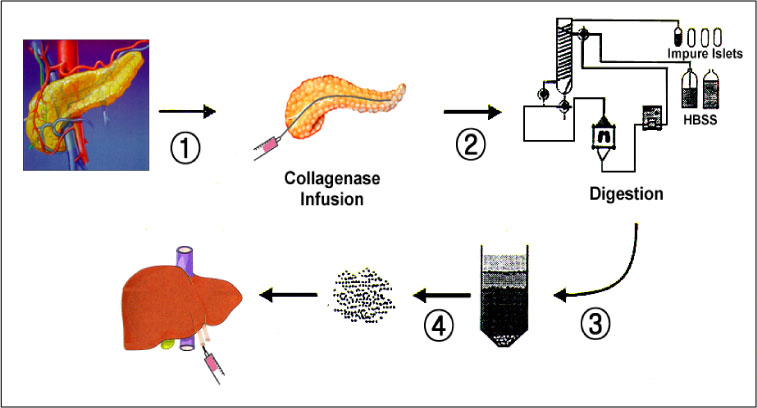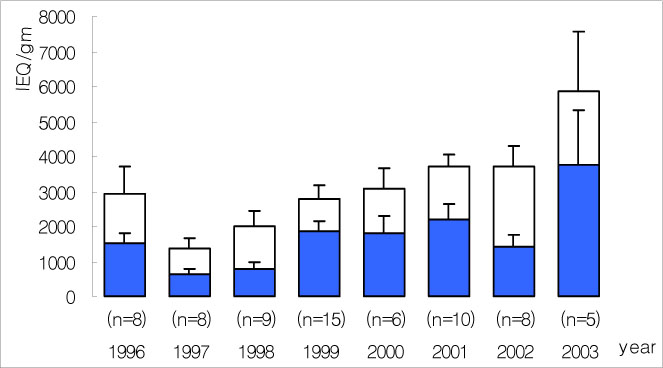J Korean Soc Endocrinol.
2006 Feb;21(1):22-31. 10.3803/jkes.2006.21.1.22.
Standardization of Isolation Procedure and Analysis of Variables on Successful Isolation of Islet from the Human Pancreas
- Affiliations
-
- 1Department of Surgery, Ulsan University College of Medicine and Asan Medical Center, Seoul, Korea.
- 2Asan Institute for Life Science, Ulsan University College of Medicine and Asan Medical Center, Seoul, Korea.
- KMID: 2200654
- DOI: http://doi.org/10.3803/jkes.2006.21.1.22
Abstract
-
BACKGROUND: Identifying the donor and isolation-related factors during the islet isolation would be greatly helpful to improve the result of human islet isolation for successful clinical islet transplantation.
METHODS
Sixty-nine pancreata from cadaveric donors were isolated with standard protocol and analyzed to identify the donor factors and isolation variables for successful isolation. Islet isolations recovered > or = 100,000 Islet Equivalent (IEQ, n=53) were compared to islet mass less than 100,000 IEQ (n=16).
RESULTS
The mean islet recovery was 216.0 x 10(3) +/- 173.7 x 10(3) (IEQ) before purification and 130.6 x 10(3) +/- 140.2 x 10(3) (IEQ) after purification. Mean purity was 54 +/- 31%. Mean age of donor was 31.2 +/- 13.2 year and mean cold ischemic time was 6.9 +/- 6.2 hour. Quality of isolated islets was acceptable in terms of bacterial culture, viability and secretory function in vitro and in vivo. In univariate analysis on successful isolation, status of pancreas was the only significant factor and sex, duration of collagenase expansion and digestion time were marginal factors. Stepwise multivariate logistic regression analysis showed donor sex, status of pancreas and digestion time were significant factors for the successful islet isolation.
CONCLUSION
This study confirms some donor factors and variables in isolation process can influence the ability to obtain the successful isolation of human islet. Enough experiences and pertinent review of donor and isolation factors can make islet isolation successful, supporting the clinical islet transplantation without spending of cost.
MeSH Terms
Figure
Reference
-
1. Nathan DM. Long term complications of diabetes mellitus. N Eng J Med. 1993. 308:1676–1684.2. The Diabetes Control and Complication Trial Group. The effects of intensive treatment of diabetes on the development and progression of long term complications in insulin dependent diabetes mellitus. N Eng J Med. 1993. 329:997–986.3. Surtherland DER, Grussner RWG. Current status of pancreas transplantation for the treatment of type I diabetes. Clinical Diabetes. 1997. 2:152–156.4. Davalli AM, Scaglia L, Zangen DM, Hollister J, Bonner-Weir S, Weir GC. Vulnerability of islets in the immediate posttransplantation period: dynamic changes in structure and function. Diabetes. 1996. 45:1161–1167.5. Bartlett ST, Schweitzer EJ, Kuo PC, Johnson LB, Delatorre A, Hadley GA. Prevention of autoimmune islet allograft destruction by engraftment of donor T cells. Transplantation. 1997. 63:299–303.6. Ricordi C, Lacy PE, Fink EH, Olack BJ, Scharp DW. An automated method for the isolation of human pancreatic islets. Diabetes. 1988. 37:2744–2749.7. Shapiro AM, Lakey JR, Ryan EA, Korbutt GS, Toth E, Warnoc GL, Kneteman NM, Rajotte RV. Islet transplantation in seven patients with type I diabetes mellitus using a glucocorticoid-free immunosuppressive regimen. N Eng J Med. 2000. 343:230–238.8. Brendel MD, Hering BJ, Schultz AO, Bretzel RG. International Islet Transplant Registry. Newsletter No. 9. 2001. 06. Vol. 8(No. 1):9. Lakey JRT, Warncock GL, Rajotte RV, Suarez-Alamazor ME, Ao Z, Shapiro AM, Kneteman NM. Variables in organ donors that affect the recovery of human islets of Langerhans. Transplantation. 1996. 61:1047–1053.10. Matsumoto S, Zhang G, Qualley S, Clever J, Tombrello Y, Strong DM, Reems JA. Anaysis of donor factors affecting human islet isolation with current isolation protocol. Transplant Proc. 2004. 36:1034–1036.11. Hering BJ, Browatzki CC, Schultz A, Bretzel RB, Federlin KF. Clinical islet transplantation--registry, report, accomplishment in the past and future research needs. Cell Transplant. 1993. 2:269–282.12. Kneteman NM, Warnock GL, Evans MG. Islet isolation from human pancreas stored in UW solution for 6 to 26 hours. Transplant Proc. 1990. 22:763–764.13. Brandhorst D, Hering BJ, Brandhorst H, Fedelin K, Bretzel RG. Influence of donor data and organ procurement on human islet isolation. Transplant Proc. 1994. 26:592–593.14. Gores PF, Gillingham KJ, Dunn DL. Donor hyperglycemia as a minor risk factor and immunologic variables as major risk factors for pancreas allograft loss in a multivariate analysis of a single institution's experience. Ann Surg. 1992. 215:217–222.15. Zeng Y, Torre Ma, Karrison T, Thistlethwaite JR. The correlation between donor characteristics and the success of human islet isolation. Transplantation. 1994. 57:954–961.16. Wrenshall GA, Bogock A, Ritchie RE. Extractable insulin of pancreas. Diabetes. 1952. 1:87–93.17. Benhamou PY, Watt PC, Mullen Y, Ingels S, Watanabe Y, Nomura Y, Hober C, Miyamoto M, Kenmochi T, Passarp EP, Zinner MJ, Brunicardi FC. Human islet isolation in 104 consecutive cases. Transplantation. 1994. 57:1804–1809.18. Tsujimura T, Kuroda Y, Avila JG, Kin T, Oberholzer J, Shapiro AM, Lakey JR. Influence of pancreas preservation on human islet isolation outcomes: impact of two-layer method. Transplantation. 2004. 78:96–100.19. Hering BJ, Matsumoto I, Sawada T, Nakano M, Sakai T, Kandaswamy R, Surtherland DE. Impact of two-layer pancreas preservation on islet isolation and transplantation. Transplantation. 2002. 74:1813–1816.
- Full Text Links
- Actions
-
Cited
- CITED
-
- Close
- Share
- Similar articles
-
- Experimental Pancreas Islet Isolation in Non- Human Primate
- Experimental Islet Isolation in Porcine Pancreas with New Enzyme Liberase PI
- Clinical Allogeneic and Autologous Islet Cell Transplantation: Update
- Distension and Collagenase Digestion Time of The Pancreas are Critical Factors in Islet Isolation of Canine Pancreas
- Clinical Islet Transplantation: Where Do We Stand on?




